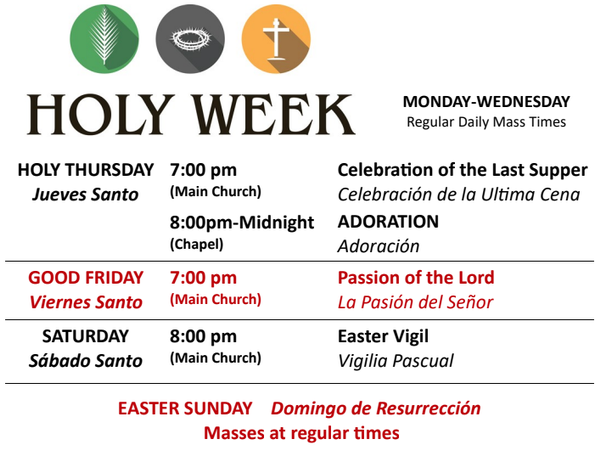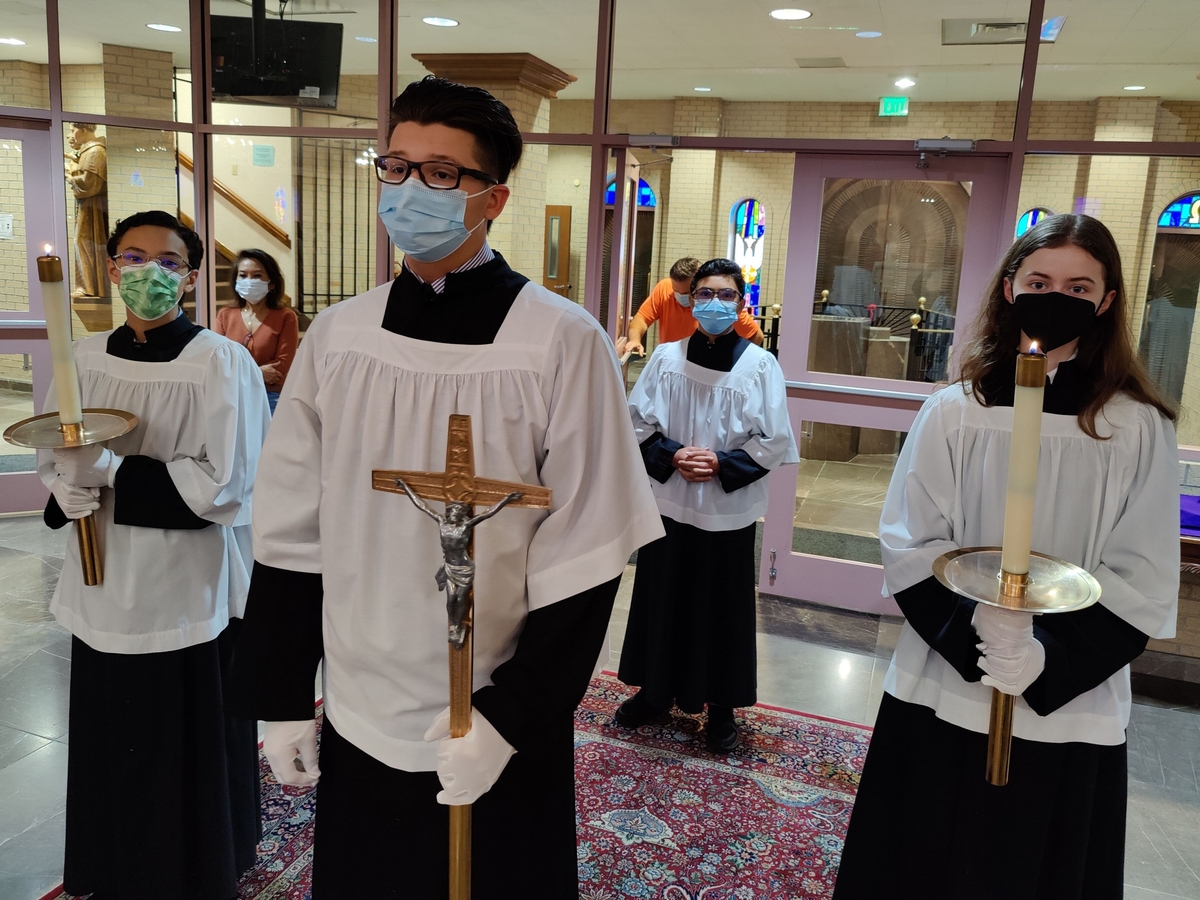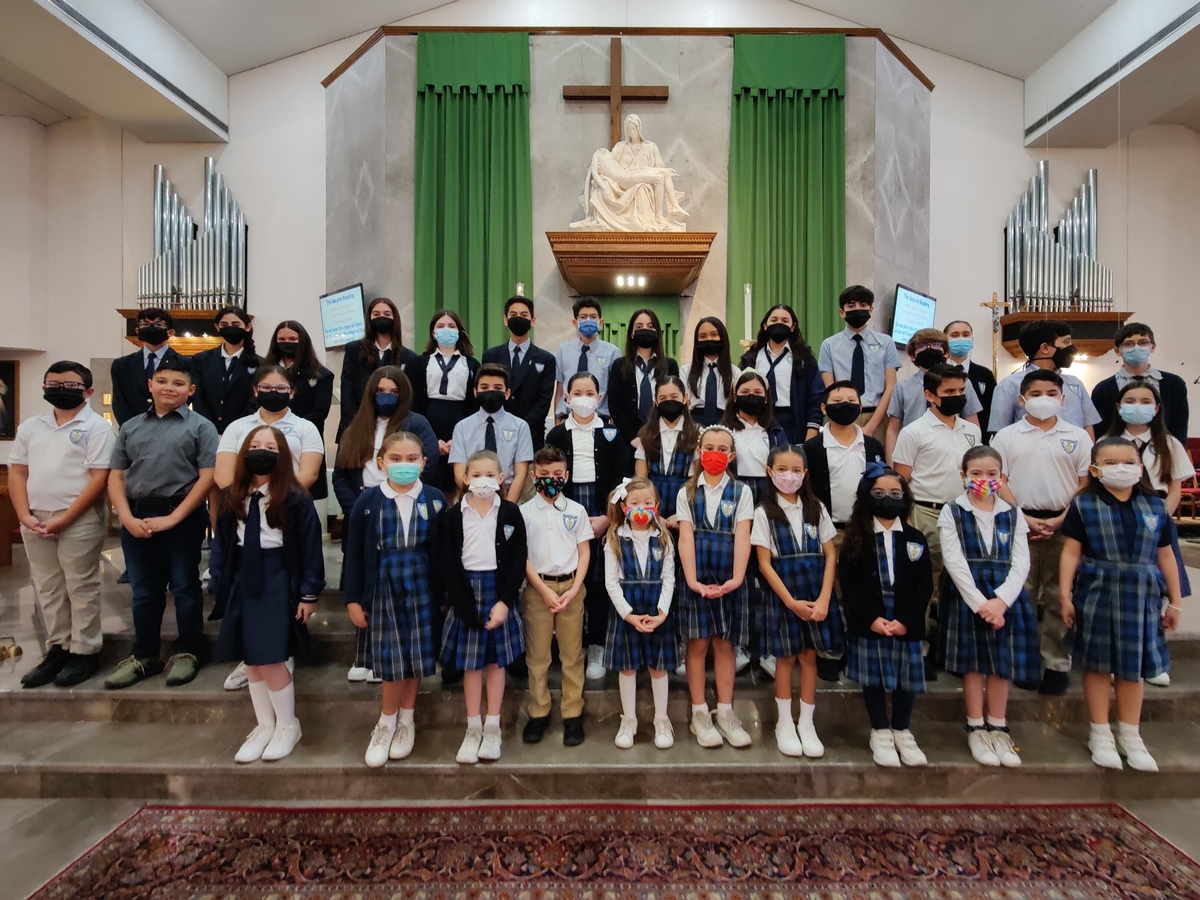Holy Week & The Paschal Triduum

Our celebration of the holy season of Lent is coming to an end as we've entered into Holy Week and are getting ready to move into the celebration of the Sacred Paschal Triduum. The Triduum is the time between Lent and Easter - it comprises the days of Holy Thursday, Good Friday, and Holy Saturday, and it's the holiest time of the year for Catholics, with some of the richest, most mysterious and sacramental celebrations of the year.
Holy Thursday gives us a chance to enter into the celebration of the Last Supper with Jesus and the Twelve Apostles. We gather together - just as they did - to pray, to share in the joys of the Eucharistic celebration, and to gather strength from our community. We strive to recognize ourselves in the obstinence of Judas, in the brashness of Peter, in the youthful exuberance and trust of John, and in the tumultuous preparation for the passion of Jesus. But we also take solace in the gift of the institution of the Eucharist that night, and rejoice in the gift of Jesus' own presence in our churches, in our homes, in our famines, and in our hearts and lives.
On Good Friday we gather together to journey with Jesus on the Via Crucis, the Way of the Cross. We follow our Lord and Master as the Suffering Servant, willing to give everything - even his very life - as an example of sacrificial love. Every Catholic tabernacle in the world lies open and empty - every sanctuary lamp is dark - we commemorate the day, even the very hour, of the death of Jesus.
But on Saturday at the Easter Vigil, we gather together in the evening to once again to celebrate the coming light of the Resurrection. We finish the liturgy begun on Holy Thursday, we brandish fire to chase away the darkness of death and despair, and we join our voices in a glorious Alleluia to our Risen God and to our own eventual resurrection.
As we prepare to finish our Lenten journey as a parish and school community, I urge you, as parents and as the first teachers of the faith, to make time - wherever you may be - to lead your family to the prayers, the rituals, the sacraments, and the mysteries of the Sacred Paschal Triduum, so that we may more fully appreciate and celebrate the gift and the joy of the Easter resurrection. Like Jesus, may we be bringers of this Good News into the lives of those around us, especially those young lives gifted and charged to our care.
May each and every one of you have a blessed and wonder-filled Triduum and Easter celebration.
Blessings & Peace,
Hugo De La Rosa III
The Identity of the Catholic School: Part 2

The Vatican Congregation for Catholic Education published a new document (on Tuesday) called The Identity of the Catholic School for a Culture of Dialogue. This document aims "to offer a more in-depth and up-to-date reflection and guidelines on the value of the Catholic Identity of educational institutions in the Church." These guidelines are given to the worldwide church against the backdrop of two guiding principles: subsidiarity (part of our Church's Catholic social teachings: that organizations exist for individuals, and that what the individual, or what the small group can do for themselves, shouldn't be done for them by the organization) and synodality (the current worldwide movement initiated by Pope Francis to help bring about communication at all levels of the Church).
This is the second of three articles summarizing and ruminating on that document.
The second part of this new document speaks to those who are responsible for promoting and verifying the Catholic identity of the community. How would you answer the question: Who is responsible for the Catholic identity of Our Lady of Sorrows Catholic School? Our bishops answer "students, parents, teachers, non-teaching personnel and the school management" - in short, everyone who is a part of the parish and school community has the responsibility to work on the Catholic identity of everyone else who forms that community. The document continues by highlighting each group:
Members of the School Community
All personnel who work and minister at a Catholic school (front office staff, teaching faculty, custodians and food service workers, administration, counselors), as well as the families (parents, extended family, children / students) who help form the community - everyone "has the obligation to recognize, respect and bear witness to the Catholic identity of the school."
Pupils and Parents
The school community helps students integrate the Catholic faith with their culture, with parents having the first and primary responsibility of educating them in their faith. As students grow older, they take on more responsibility for their own growth in knowledge and faith, but always guided by their parents and other adults in their extended family. For those of us who are parents, the obligation to foster the faith of our children never fades.
It's necessary as well, as parents of school-aged children, to work closely and cooperate with their teachers, become involved in their education and the school / parish community, and participate in activities and groups geared towards parents and families. This helps parents to continue to grown in wisdom and faith, which in turn helps them to be role models of faith to their children. Choosing to send a child to a Catholic school, just as choosing to have children as part of a family, necessarily entails a sacrifice of parental time and energy in fulfilling the responsibilities of raising a child formed in faith and ready to serve society at large.
Teachers and Administrative Personnel
Teachers and staff have the important responsibility of sharing the faith both in word (teaching) and deed (actions). As a Catholic school community, this is part of the ministry of education. Faculty and staff should be hired with an eye towards their ability not only to fulfill contractual obligations, but by their practice of the Catholic faith as well, and, barring that practice, by their willingness to adhere to and promote the authentic teachings of the Catholic Church.
School Leaders
School leaders should be chosen with the same criteria listed above, as they have the added responsibility of partnering with the pastor to ensure the Catholicity of the school community. This responsibility extends to curriculum, facilities, and management of the campus, but is always rooted in the teachings of the Catholic Church. School leaders, then, have the responsibility of safeguarding the Catholicity of the campus in doctrine and in action, wether that intervention is towards faculty & staff, students, or families.
Educational Charisms in the Church
"Charism" is a word usually applied to religious communities, denoting their special gift to the Catholic Church. Some religious communities, for example, are known for their gift of teaching and education (the Jesuits); some are known for their example of poverty, humility, and service (the Franciscans); and some are know for their dedication to community and their gift of preaching (the Dominicans).
The Definition of Catholic School
Working at a Catholic school is an apostolate, a gift of ministry to the Church, with each member of the Church being called to certain charisma (gifts). The local Bishop (Bishop Flores, assisted by Bishop Mario) has primary responsibility for the work done in all Catholic churches in his diocese, followed by the pastor (Msgr. Barrera for OLS), and then the administrators (Mr. Martinez as principal of OLS). The Bishop alone, however, can designate an institution as Catholic; here in Texas, once designated as a Catholic school, we are also governed by the Texas Catholic Conference of Bishops Education Department (TCCBED) who conduct assessments every seven years to accredit a school as a Catholic institution. Families, parents, and faculty and staff bring the charisms of their individual gifts and talents, all working together under the guidance and direction of the administrators, pastor, and Bishop.
My Thoughts
This section of the document highlights that every single person who is part of a Catholic school has duties and responsibilities to fulfill as well as gifts and talents to share. Far from working independently of each other, parents, extended family, faculty and staff, pastor and Bishop - all are called to work together in co-responsibility to challenge each other to grow in wisdom and faith. An attitude of listening and respect from all involved helps bring the reality of Christian dialogue to a school community, while also teaching the children that are part of that community how to interact not only through adult words, but more importantly through adult actions.
Choosing a Catholic school necessarily entails choosing it for its Catholic identity - that the academic program is rigorous, that there are many extracurricular activities for children to join, that the athletic program is award-winning, that the geographical area is desirable, or that the community is socially or economically advantaged - these are on the peripheries of choosing a Catholic education. Important to consider, yes; but they should never cloud the fact that the only reason a Catholic school exists is for the foundational and fundamental education in the Catholic faith of the members of that school community.
Blessings & Peace,
Hugo De La Rosa III
The Identity of the Catholic School: Part 1

The Vatican Congregation for Catholic Education published a new document (on Tuesday) called The Identity of the Catholic School for a Culture of Dialogue. This document aims "to offer a more in-depth and up-to-date reflection and guidelines on the value of the Catholic Identity of educational institutions in the Church." These guidelines are given to the worldwide church against the backdrop of two guiding principles: subsidiarity (part of our Church's Catholic social teachings: that organizations exist for individuals, and that what the individual, or what the small group can do for themselves, shouldn't be done for them by the organization) and synodality (the current worldwide movement initiated by Pope Francis to help bring about communication at all levels of the Church). This is the first of three articles summarizing and ruminating on that document.
The Church, Mother & Teacher
The document begins by reminding us that the Catholic Church is a gift given to the entire world by Christ - a gift of maternal love and care, both for Catholics and all people of good will, regardless of the spiritual path they practice. As our universal mother, the Church is also a guide and teacher to both individuals and groups. The educational nature of our Church, then, "represents an essential part of her identity and mission."
Implicit in these reminders is the underlying assumption that, when we speak of the Church, we are speaking of both the institutional hierarchy (Pope, cardinals, bishops, priests, and deacons) who exercise their authority to teach, but also to parents as the first educators of their children and their families (the domestic church), as well as to those of us who have the joy of ministering in a Catholic school. We are called - as educators and parents - to educate ourselves, our families, our co-workers, and our students both with our words and our actions.
The Fundamental Principles of Christian Education in Schools
Building on previous church documents having to do with education, the document lays out several fundamental principles for Catholic identify in a Catholic school:
Universal right: all people have a fundamental right, as befits their dignity as human persons, to receive a quality education
Responsibility for all: parents have the primary responsibility of educating their children; the state and civil authorities have the responsibility of ensuring that all parents have choices and options in regard to when and where parents choose to share that responsibility with professional educators; we as the Church have the responsibility of evangelizing (preaching the good news of Jesus through word and deed) and catechizing (teaching the fundamentals of the faith in age-appropriate ways) Catholics and all people of good will
Formation of teachers: as an apostolate (a ministry within the Church), educators in Catholic schools are to be continuously formed in both their personal and professional lives, to give witness to Christ through their ministry of teaching
Mutual cooperation & community: parents and teachers must work together for the betterment of students, both educationally and morally; educators are called to be mentors and guides, as well as educational teachers, so that the "Catholic school prepares pupils to exercise freedom responsibly, forming an attitude of openness and solidarity."
Further Developments
The Dynamic Profile of the Catholic School Identity
As a school, we are called and challenged to both educate each child and to help form them as whole persons - academically, socially, physically, emotionally, and spiritually. Educational institutions are second only to the family as the place where children grow and develop, especially in their thirst for knowledge and the ability to use their freedom, gifts, and talents for the greater good.
As a specifically Catholic school, we are called to help students center their lives on Jesus Christ, both as a personal and communal relationship that stresses the life and teachings of Jesus, Mary and the saints, and the example of parents, relatives, and the local community. We are called and challenged to use all the tools at our disposal to present the Good News of Jesus in age-appropriate and relevant ways to our students, just as Jesus used the images, the stories, and the lives of the people he preached and ministered to.
Finally, as a Catholic school, we are called to be a school for all who wish to have a Catholic education, especially those who are "socially and economically disadvantaged." Far from being a place for only the privileged or the wealthy, Catholic schools should be bastions of faith and hope for all parents who wish to give their children the gift of a deeper experience of their faith while at the same time nurturing a strong academic foundation.
The Witness of Lay and Consecrated Educators
The document reminds us that education in a Catholic setting involves both acquiring knowledge and growing in wisdom. In most Catholic educational settings, this teaching is done by lay professionals (non-clergy, non-consecrated; people that are single or married, but not a priest, nun, brother, etc.). These lay teachers, however, perform this job and ministry to the Church as an act of service, not solely as a profession. Together with consecrated educators, we form a community that has, as it's mission, the education and formation of our students and individual campuses.
Educating to Dialogue
As a Catholic school, one of our challenges is to be open to different cultural expressions of faith, and indeed, to expressions of faith from other world religions. We do so by "welcoming pupils from different cultural backgrounds and religious affiliations." We are then called to bear witness to our Catholic faith in word and deed; to impart true, charitable, and correct knowledge about our Catholic faith to all students that hopefully leads to a fruitful life in Christ while respecting each families' religious choices; and to be willing to dialogue with the diverse cultures and religions present in our school communities.
As a church institution, each Catholic school if further called and challenged to continual evangelization even as we engage in fruitful dialogue with those who practice a different faith. The three principles Pope Francis gives us for this fruitful dialogue are:
- to respect one's own identity and that of others
- the courage to accept differences (we should not treat those who are different from us as enemies but "welcomed as fellow travelers"))
- sincerity of intention (dialogue for the sake of mutual learning, not solely for the sake of conversion)
We are called to be a Catholic school that "goes forth" to others as an inclusive, welcoming, affirming, respectful, and peacemaking community that both instructs our community in word and deed and exercises a "culture of care" for all constituents: children, families, faculty & staff, parish community, and the wider community. Our prayer is that we, and every other Catholic educational institution, does the same.
Blessings & Peace,
Hugo De La Rosa III
